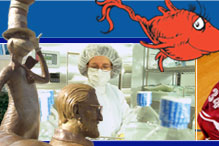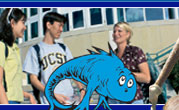Sixth College
Culture, Art, and Technology Courses, Curricula
and Program of Instruction
The theme of Sixth College, Culture, Art, and Technology,
was motivated by the rich intellectual challenges inherent in the
intersection of technology, culture, and the arts. The educational
philosophy exploits the college theme to create a curriculum that
will prepare students for a future that demands ethical integrity;
teamwork skills; ability to adapt to rapid change; aptitude to think
abstractly; the competence to acquire, process, and evaluate new
information critically; and the proficiency to communicate across
disciplinary boundaries. To achieve this goal, Sixth College will
create a learning environment, both inside and outside the classroom,
which will emphasize collaborative learning, pattern recognition,
deductive reasoning and creative imagination, and the ability to
hypothesize, interpret, and express thoughts and ideas through the
effective use of communication tools that include the digital medium.
Sixth College will provide the skills necessary for lifelong learning,
including fluency with information technology and information literacy,
and the crucial ability to seek out and learn from experts.
On campus and off, students will be linked in many ways—by
digital media, by social and local engagement, by cultural and intellectual
projects—so that Sixth College becomes an identifiable, sustaining
community that is always reaching out to others.
A fundamental underpinning of the Sixth College philosophy is to
create a sense of students’ connectedness to the college, to
UCSD, and the community at large by creating virtual communities.
For example, we will create "Study Rooms" that will include
a series of short video streamed lectures. The user will be able
to watch and listen to a professor’s lectures in any order,
and each lecture will feature visual images, outlines, and charts
to enrich the user’s understanding and enjoyment. Along with
the illustrated lectures, the study room will link students to an
array of Web sites selected by the faculty as sources of additional
information. Each room will have a reference section, with an annotated
list of suggested books, articles, journals, films, and other ancillaries
prepared by the faculty.
Sixth College challenges students to examine the multidimensional
interactions between culture, art, and technology, in order to imagine
the future and create new forms of inquiry and communication. Teamwork,
artistic expression, interdisciplinary ways of thinking and knowing,
and multicultural awareness are core educational goals. Sixth College
students will be encouraged to engage with the outlying community.
More than an ethical obligation to service, such an engagement is
integral to the process of learning to listen across cultures and
to consider implications of diverse agencies of change. Sixth College
is committed to pioneer meaningful application of evolving technologies
inside and outside the classroom. For example, wireless communication
technology will be incorporated into the very design of this college’s
physical infrastructure and curricular planning, allowing Sixth
College to pioneer radically new teaching, communication, community,
and lifelong learning paradigms. The Sixth College community will
collectively and consistently be reflecting upon itself. Through
“Active Research,” students may study how they and their
Sixth College companions learn in and beyond the classroom. This
research will become the basis for shifts in the curriculum, teaching
methods, modes of administration, and residence hall culture. Our
students will help continuously transform Sixth College.
Culture, Art, and Technology
All students will take a three-quarter core sequence titled Culture,
Art, and Technology (CAT). CAT is a highly interdisciplinary sequence
integrating learning in arts and humanities, social sciences, and
science and engineering. It introduces students to thinking across
disciplines so they can identify interactions, recognize patterns,
and provide opportunities for learning by inquiry in a collaborative
environment. Exercises and instruction that develop fluency with
information technology and information literacy, as well as writing
and communication skills, will be embedded in the core sequence.
General-Education Requirements
The Sixth College breadth requirements have three primary goals:
(1) to produce breadth of knowledge and connections across that
breadth, (2) to encourage creative imagination, and (3) to accomplish
these activities from an ethically informed perspective. The aim
is to allow students to discover the richness of UCSD's academic
life and to see relationships among the sciences, social sciences,
engineering, arts, and the humanities. Because Sixth College emphasizes
cross-disciplinary ways of thinking, it is critical for students
to appreciate the different modes of inquiry within academic disciplines.
For information about courses available to satisfy the general-education
requirements, please visit the academic advising office in the Sixth
Administration Building or check the Web site at sixth.ucsd.edu.
- Culture, Art, and Technology: Three courses. Core Sequence
CAT 1, 2, and 3. Includes two (6 unit) quarters of intensive instruction
in university-level writing.
- Computing Requirement: One course. This requirement may
be satisfied with courses from a variety of departments,
including CAT 4.
- Modes of Inquiry: Seven courses. Two courses in social
sciences, two courses in humanities, two courses in natural sciences,
one course in math/logic (different options available for science
and non-science majors).
- Understanding Data: One course in statistical methods
(different options available for science and non-science majors).
- Societal and Ethical Contexts: Two courses. One course
in ethnic or gender studies AND one course in ethics.
- Art Making: Two courses in literature, music, theatre
(including dance), or visual arts.
- Practicum: Students must complete an upper-division project,
and present the project with a two-unit course in Practicum Communication.
See the Sixth College advising center for details. For B.A. and
B.S. degrees in arts and sciences, at least eleven of the general
education courses must lie outside the requirements specified
by one of the student’s major departments or programs. For
B.S. degrees in engineering, at least nine of the courses must
lie outside the major requirements.
Graduation Requirements
In order to graduate from Sixth College all students must:
- Satisfy the University of California requirements in Subject
A and American History and Institutions (See Academic Regulations:
Subject A; and American History and Institutions).
- Satisfy the general-education requirements.
- Successfully complete a major according to all regulations of
that department.
- Complete a minimum of fifteen upper-division courses (60 units).
- Pass at least 180 units for the B.A./B.S. degree. No more than
3 units in physical education (activity) courses may count toward
graduation.
- Attain a C average (2.0) or better in all work attempted at
the UC. Departmental requirements may differ. Students are responsible
for checking with the department of the major for all regulations.
- Meet the senior residence requirement. (See Academic Regulations:
Senior Residence).
Transfer Students
Transfer students will be admitted to Sixth College beginning
in fall 2004. Please see an academic counselor at Sixth for details.
Majors and Minors
Majors: Sixth College students may pursue any of the departmental
or interdisciplinary majors offered at UCSD. The majority of the
academic departments have established lower-division prerequisites.
Generally, these prerequisites must be completed prior to entry
into upper-division major courses. Many of these courses may count
for general-education credit as well. Students are strongly encouraged
to work closely with department faculty and college advisers. For
details on the specific major departments, refer to the "Courses,
Curricula, and Programs of Instruction" section of this catalog.
Minors are optional. However, students are encouraged to
keep as many options open as possible. A minor provides an excellent
opportunity to complement the major field of study. Students are
required to complete twenty-eight units of interrelated work, of
which at least twenty units must be upper-division.
Pass/Not Pass Grading Option
Some general-education requirements may be fulfilled by courses
taken on the Pass/Not Pass basis. Sixth College students are reminded
that major requirements and prerequisites must be taken on a graded
basis. In accordance with University Academic Regulations, the total
number of Pass/Not Pass units may not exceed one-fourth of a student’s
total UCSD units.
Honors
Quarterly provost’s honors, honors at graduation, departmental
honors, and Phi Beta Kappa honors are awarded. For additional information
see "Honors" in the index.
|


